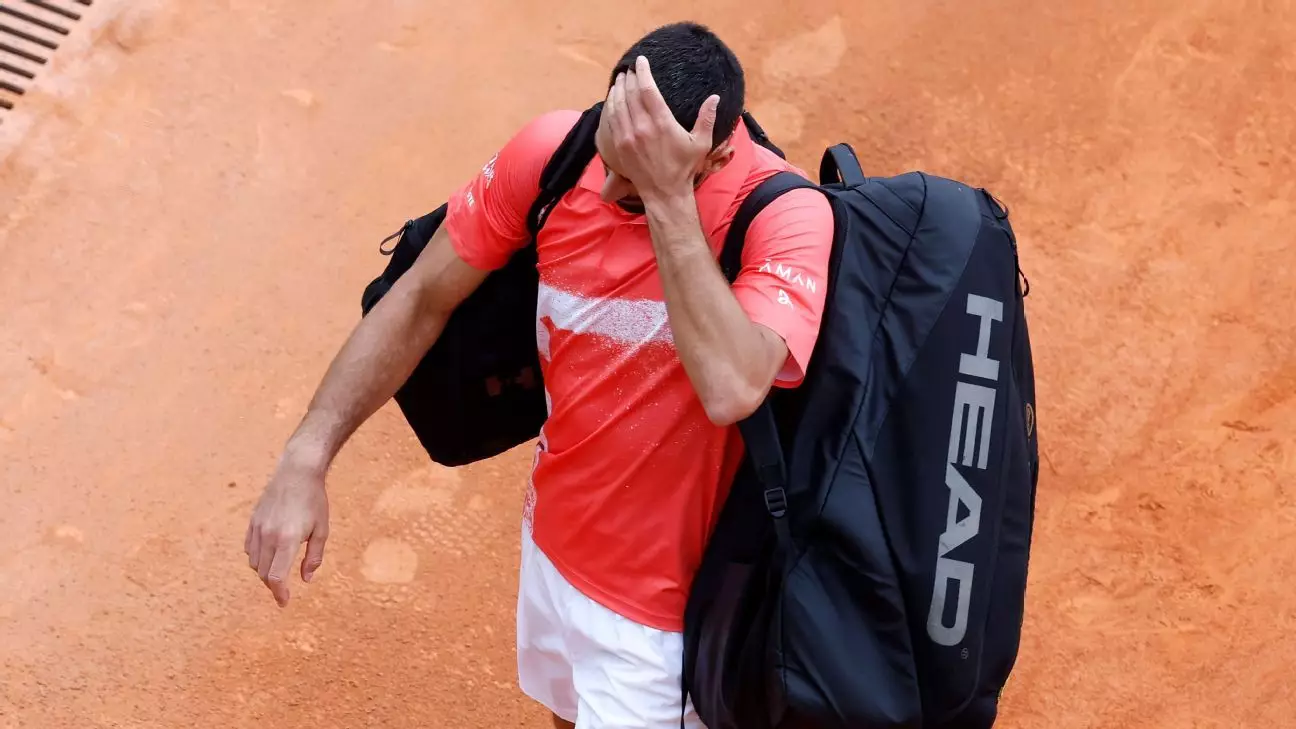In the world of professional tennis, where mental fortitude often rivals physical prowess, Novak Djokovic’s latest defeat offers a poignant reminder of how unpredictable the sport can be. Alejandro Tabilo, an emerging star from Chile, once again stunned the tennis community by defeating the 24-time Grand Slam champion in a strikingly emphatic manner at the Monte Carlo Masters. For a player like Djokovic, who has performed at the highest levels for nearly two decades, a 6-3, 6-4 loss to an opponent he had struggled to overcome previously raises numerous questions about his form and mindset heading into the clay season.
Tabilo’s victory was not an inexplicable fluke; rather, it revealed a high level of preparation and execution culminating in a finely-tuned performance. He noted post-match that he had drawn confidence from their previous face-off at the Italian Open last year, where he had similarly bested Djokovic. Tabilo’s ability to serve effectively under pressure propelled him through the match and showcased the layers of strategy that permeate elite competitive tennis.
The Emotional Toll on Djokovic
Djokovic’s reaction to his defeat was both candid and illuminating. He openly expressed disappointment in his performance, labeling it as “horrible.” This level of self-critique from a champion typically known for his unyielding self-belief reveals the psychological weight he carries. It raises concerns about whether the relentless pressure to win—especially the chase for a historic 100th title—is beginning to impact his confidence. The 29 unforced errors he committed reveal a player struggling with self-doubt in critical moments, allowing Tabilo to seize the initiative decisively.
Moreover, Djokovic’s acknowledgment that he entered the match with low expectations is troubling. The mindset of an elite athlete often hinges on the belief that they can conquer challenges, a represented illusion of invincibility. Hearing a champion declare otherwise not only humanizes him but also highlights a potential vulnerability that could hinder his quest as he competes in the lead-up to the French Open—a tournament that historically has defined his legacy on clay.
The Rise of Young Talent
While Djokovic’s struggles paint a picture of uncertainty, the rise of younger players like Tabilo and Carlos Alcaraz symbolizes emerging hope within the sport. Alcaraz’s invigorating victory against Francisco Cerundolo demonstrates how quickly the torch can be passed, with the younger generation eager to claim their stake. Alcaraz navigated through a rocky start to the match with a confident display of adaptability and aggression, winning in dominant fashion thereafter. His ability to recover and display tactical brilliance reflects not just talent, but a profound understanding of the nuances in a match.
This shift towards youth presents a double-edged sword for tennis as it struggles to retain its veteran icons while engaging a newer, dynamic cohort of competitors. The specter of age versus youth adds layers to an already intricate narrative, inviting fans to question the sustainability of greatness in the face of new talent routinely knocking on the doors of elite competition.
What Lies Ahead
As the clay season progresses, the dynamics of this year’s tournaments hint at an era unapologetically embracing change. The Monte Carlo Masters, as the inaugural major clay-court event of the season, provides a refreshing backdrop for the surprises that lie in wait. Djokovic’s form can evolve; his ability to navigate the emotional landscape of competition can shift the narrative abruptly. However, the journey will undeniably be tumultuous, requiring adjustments in strategy, mindset, and perhaps even expectations.
Meanwhile, players like Tabilo and Alcaraz demonstrate that the road to victory is shaped not only by experience but by daring to challenge the established order. As we approach critical upcoming tournaments, the stage is set for a series of pulsating confrontations between the old guard and these invigorating challengers. The unfolding saga at the Monte Carlo Masters captures the delicate balance between resilience and vulnerability, reminding us that in sports, even the most dependable champions are susceptible to the unexpected embrace of defeat and triumph alike.

